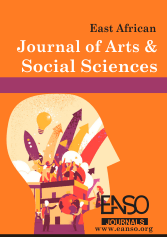Digital Transformation in the Creative Media: Opportunities, Risks, and Research Questions
Abstract
The digital transformation is a complete reshaping of creative media because networked digital technologies are integrated in the production, distribution, and reception of creative content. This research paper will serve to firmly plant audio engineering, video production, acting, performance, and all facets of creative teaching on solid theoretical grounds. The paper essentially uses Stalder’s discussion of network society based on the explanation of Manuel Castells and Manovich’s understanding of software-driven media to argue that digital transformation is a 3D process involving the combination of technology, practice and society. The elements come from new forms of creativity with structural problems arising from artificial intelligence, cloud collaboration, and algorithmic curation. Factors such as the low-cost digital audio workstation, streaming platforms, virtual performance spaces, and e-learning systems are some of the opportunities with abundantly accessible production. At the same time, there will be various risks that arise, including disputed quality and authenticity criteria, dependence on proprietary systems, changing copyright law, and complex ethical issues related to the use of AI in creation. This paper presents general research questions that shall be investigated by future researchers on whether Artificial Intelligence can have a significant role in authorship and aesthetics. The paper offers a theoretical framework through which scholars can easily see interdisciplinary communication and the scientific exploration of the fast-changing creative media environment by making use of conceptual definitions, a synthesis of major theories, and an analytical model that can be reproduced
Downloads
References
Stalder, F. (2006). Manuel Castells: The theory of the network society. Polity.
Journal Articles
Birke, D., & Hartl, A. (2025). Theatre in the Digital Age: Concepts, Perspectives, Developments. Journal of Contemporary Drama in English, 13(1), 1-14. https://www.degruyterbrill.com/document/doi/10.1515/jcde-2025-2001/html
Papacharissi, Z. (2019). Affective publics: Sentiment, technology, and politics. Oxford University Press. https://global.oup.com/academic/product/affective-publics-9780199999736
Aghazadeh, S., Sepehri, M., & Pahlevan Sharif, S. (2022). Digital transformation and cultural identity: Reconsidering creativity in virtual spaces. Journal of Cultural Communication Studies, 14(3), 211– 226. https://doi.org/10.1080/14791420.2022.2045781
Peters, M. A., Besley, T., Araya, D., & Zembylas, M. (2014). The new digital media and cybercultures of education. Peter Lang. https://www.peterlang.com/document/1051499
Chalak, A., & Mair, C. (2025). Investigating the Integration of E-Learning in Higher Education: Challenges and Opportunities Through the Eyes of German vs. Iranian Students. Journal of Research in Applied Linguistics, 16(1), 137-156. https://rals.scu.ac.ir/article_19755.html
Hess, T., Benlian, A., Matt, C., & Wiesböck, F. (2016). How German media companies defined their digital transformation strategies. MIS Quarterly Executive, 15(2), 103-119. https://www.researchgate.net/profile/Christian-Matt/publication/291349362_Options_for_Formulating_a_Digital_Transformation_Strategy/links/5859227208aeabd9a58b2546/Options-for-Formulating-a-Digital-Transformation-Strategy.pdf
Jakobsson, P. (2024). Lev Manovich (2001) The Language of New Media. In Classics in Media Theory (pp. 390-402). Routledge. https://www.taylorfrancis.com/chapters/edit/10.4324/9781003432272-29/lev-manovich-2001-language-new-media-peter-jakobsson
Jenkins, H., & Jie, Y. (2024). The path from participatory culture to participatory politics: A critical investigation—An interview with Henry Jenkins. Communication and the Public, 9(1), 11- 30. https://journals.sagepub.com/doi/abs/10.1177/20570473231224816
Klüh, U. (2025). " Hyperledger" versus" hyperscaler"? Can coopetition on decentralized platforms be a countervailing power to big tech? Platform capitalism between new and old forms power (No. 14). ZNWU Discussion Paper. https://www.econstor.eu/handle/10419/313639
Leininger, P., Weber, C. J., & Rothe, S. (2025, June). Understanding Creative Potential and Use Cases of AI-Generated Environments for Virtual Film Productions: Insights from Industry Professionals. In Proceedings of the 2025 ACM International Conference on Interactive Media Experiences (pp. 60-78).
Luka, M. E., Grohmann, R., & Idiz, D. (2025). Creative Labour Critical Futures: A Way to Think Through AI Challenges. https://criticaldigitalmethods.ca/creative-labour-critical-futures/wp-content/uploads/2025/06/CLCF_Submission_AI_and_Creativity.pdf
Manitsaris, S., Glushkova, A., Spyridonos, A., & Senteri, G. (2025). Working with AI in Cultural and Creative Industries. https://hal.science/hal-05016368/
Verina, N., & Titko, J. (2019). Digital Transformation: Conceptual Framework. In Proceedings of the 6th International Scientific Conference Contemporary Issues in Business, Management and Economics Engineering (pp. 721-724). DOI: 10.3846/cibmee.2019.073
Wang, N., Kim, H., Peng, J., & Wang, J. (2025). Exploring creativity in human–AI co-creation: A comparative study across design experience. Frontiers in Computer Science, 7, Article 1672735. https://doi.org/10.3389/fcomp.2025.1672735
Copyright (c) 2025 Lars Arnold Ritter

This work is licensed under a Creative Commons Attribution 4.0 International License.




























